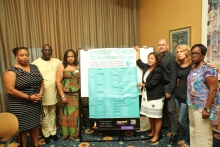Visits to the United States and the three most affected countries

A small delegation including representatives from PSI, the Nigerian Labour Congress and PSI affiliate SEIU (local health branch 1199), participated in the UN Ebola Conference at the beginning of July 2015, in New York. PSI intervened in the conference on the importance of creating strong public healthcare systems, safe and secure working conditions, with mechanisms for dialogue and bargaining between unions and government which are key to delivering quality public services and the fiscal gap the countries face in the long term which can only be addressed through tax justice.
1199SEIU then hosted a panel discussion attended by 200 participants which focused on the devastation of West Africa’s most vulnerable nations by Ebola. Participants also talked about the grave consequences for healthcare workers and how they are rebuilding their countries, their lives and continuing as caregivers.
In October 2015, PSI and 1199SEIU jointly organized a series of lobby meetings and awareness-raising activities in Los Angeles, Washington and New York, aimed at clarifying the political problems linked to the Ebola Virus Disease including calling on governments, the UN and donor agencies to build strong public health and social services systems with unions as partners in preparedness and containment of Ebola.
The delegation, headed by PSI General Secretary, Rosa Pavanelli, included representatives of PSI affiliates from the healthcare unions in Liberia and Sierra Leone, and Ghana and met with representatives of the Solidarity Center, USAID, World Bank, Karen Bass, ranking Democrat on the Foreign Affairs Subcommittee on Africa, and Rear Admiral Scott Giberson, U.S. Assistant Surgeon General.
The members of the delegation denounced the structural problems of their national healthcare sectors, the working conditions of the health workers and the refusal of their governments to involve the workers in the elaboration of recovery plans. Only the Ghanaian union has been able to work on an Ebola plan in collaboration with its government.
The mission to the US concluded in New York with a series of awareness-raising activities in a wide range of health institutions, including an exchange on Ebola preparedness with the staff of an American Ebola unit.
Lobby meetings in Monrovia, Freetown and Conakry
The delegation followed up with advocacy work in the three affected countries targeting different players in the sector including international institutions, NGO’s, donors, but also CSOs. With our visits, we wanted to get the voice of the workers out and denounce the fact that unions are not included in the discussions on the recovery plan. Thereby, we hoped to create some long term collaborations and support for better working conditions and the elaboration of a qualitative healthcare system.
The message focused on crisis preparedness and the need to make structural changes in the healthcare sector as well as the link between working conditions and qualitative health services highlighting the importance of the role of trade unions in the elaboration of post-Ebola policies and underlining the remaining problems in the area of wages of health workers and support for families of deceased healthcare workers. In Liberia, the government’s failure to comply with ILO conventions on the right to organize and freedom of association was also added to the message.
The delegation met with representatives of the European Union, of different UN programmes and agencies such as the WHO, UNFPA, UNDP and World Bank, and representatives of the Ministries for Health and the WAHO (West African Health Organisation) as well as with the historical donors in every country, respectively USAID (Liberia), DFID (Sierra Leone) and Agence Française de Développement (Guinea).
In Liberia, PSI managed to put the subject of wages for healthcare workers and support for the families on the agenda of the Protection Partner Forum, despite the attempts of the presiding deputy Minister of Justice to pass over this topic.
-
Read the publication on-line
-
Download a PDF of "PSI's Trade Union Response to the Ebola Virus Disease"
-
More on the PSI's Ebola response
-
Also see PSI's work on Health and Social care services
In this issue:
- Foreword: PSI Health Priorities and Trade Union Response to the Ebola Virus Disease
- A global view on the impact of Ebola
- Trade union response: the ebola response strategy
- Work on the ground: three national action plans
- The survey: mapping missing wages, hazard fees and family support
- Lobby: visits in the three most affected countries and the United States
- Liberia: trade union rights under attack
- Congo: unite the unions
- Ghana: unions involved

